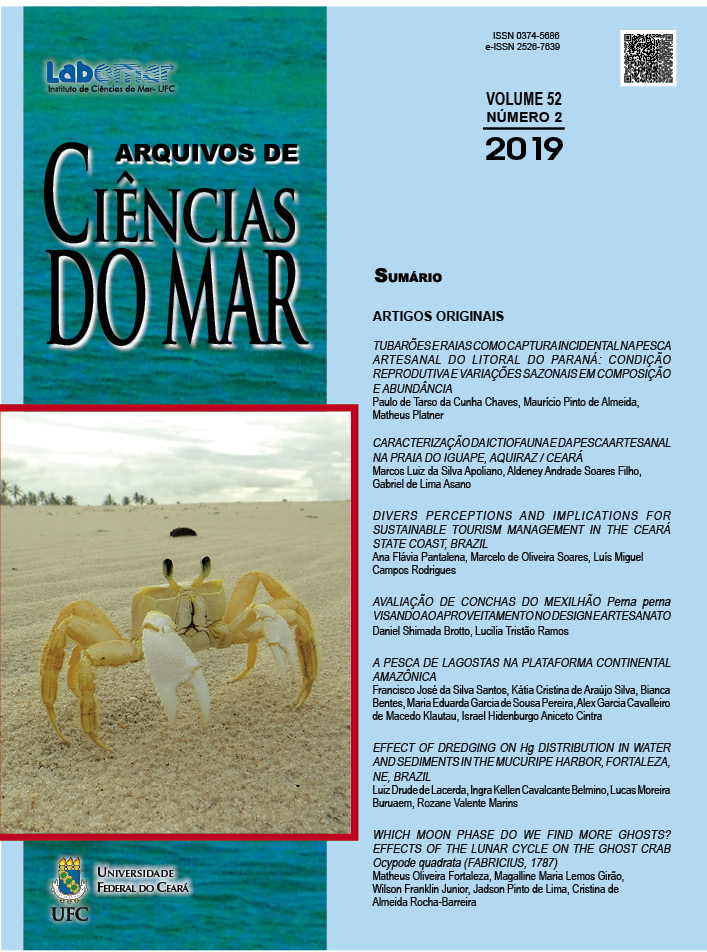DIVERS PERCEPTIONS AND IMPLICATIONS FOR SUSTAINABLE TOURISM MANAGEMENT IN THE CEARÁ STATE COAST, BRAZIL
DOI:
https://doi.org/10.32360/acmar.v52i2.40747Abstract
- The analysis of the perceptions of divers can be a useful tool for developing sustainable tourism. Despite its importance, there is still little understanding of the role of perceptions of environmental and infrastructure problems in the improvement of diving tourism in developing countries. This study assesses the perceptions of 140 divers regarding different diving sites in the Ceará State Coast, northeastern Brazil. The results indicate that, despite the existence of 32 diving sites, only the Marine Protected Area (MPA) was regularly visited. This area was classified as “good/very good” in terms of its marine biodiversity. One of its particularities is the presence of reef environments. The divers gave the boats, and the operations of embarking and disembarking a “bad/poor” rating. Moreover, travel times and the presence of marine litter and abandoned fishing nets were considered as “reasonable/medium”. Finally, this study discusses various strategies for preserving tropical marine biodiversity and maximizing the enjoyment of divers. These include the monitoring of illegal fishing, implementing the management plan of MPA, and improvements to the diving infrastructure. Understanding the preferences of recreational divers regarding dive experiences can strengthen sustainable tourism and be of great importance to the support of public policies and coastal management.
Keywords: diving tourism, coastal management, marine protected areas, coastal tourism.
Downloads
References
Asafu-Adjaye J, Tapsuwan S (2008) A contingent valuation study of scuba diving benefits: Case study in Mu Ko Similan Marine National Park, Thailand. Tourism Management 29:1122–1130. doi: 10.1016/j.tourman.2008.02.005
Andrade AB, Soares MO (2017) Offshore marine protected areas: Divergent perceptions of divers and artisanal fishers. Marine Policy 76:107–113. doi: 10.1016/j.marpol.2016.11.016
Bennett NJ, Dearden P (2014a) Why local people do not support conservation: Community perceptions of marine protected area livelihood impacts, governance and management in Thailand. Marine Policy 44:107–116. doi: 10.1016/j.marpol.2013.08.017
Bennett NJ, Dearden P (2014b) From measuring outcomes to providing inputs: Governance, management, and local development for more effective marine protected areas. Marine Policy 50:96–110. doi: 10.1016/j.marpol.2014.05.005
Bramanti L, Vielmini I, Rossi S, et al (2011) Involvement of recreational scuba divers in emblematic species monitoring: The case of Mediterranean red coral (Corallium rubrum). Journal for Nature Conservation 19:312–318. doi: 10.1016/j.jnc.2011.05.004
Brander LM, Van Beukering P, Cesar HSJ (2007) The recreational value of coral reefs: A meta-analysis. Ecological Economics 63:209–218. doi: 10.1016/j.ecolecon.2006.11.002
Camp E, Fraser D (2012) Influence of conservation education dive briefings as a management tool on the timing and nature of recreational SCUBA diving impacts on coral reefs. Ocean & Coastal Management 61:30–37. doi: 10.1016/j.ocecoaman.2012.02.002
Chung S-S, Au A, Qiu J-W (2013) Understanding the underwater behaviour of scuba divers in Hong Kong. Environmental Management 51:824–37. doi: 10.1007/s00267-013-0023-y
Craig RK (2008) Fishers, Divers, Scientists, Lawyers, and Marine Protected Areas: The US Experience in Protecting Coral Reefs. Tourism in Marine Environments 5:89–99. doi: 10.3727/154427308787716721
Debrot AO, Nagelkerken I (2000) User perceptions on coastal resourse state and management options in Curacao. Revista de Biologia Tropical. 12.
Fitzsimmons C (2008) Why dive? and why here? a study of recreational diver enjoyment at a fijian eco-tourist resort. Tourism in Marine Environments 5(2-3):159–173. doi: DOI: 10.3727/154427308787716785
Freitas JEP, Lotufo TM da C (2015) Reef fish assemblage and zoogeographic affinities of a scarcely known region of the western equatorial Atlantic. Journal of the Marine Biological Association of the United Kingdom, UK 95:623–633. doi: 10.1017/S0025315414001404.
Germany J (2011) Situating Fortaleza: Urban space and uneven development in northeastern Brazil. Cities 28:45–52. doi: 10.1016/j.cities.2010.08.004
Giglio VJ, Luiz OJ, Gerhardinger LC (2011) Depletion of marine megafauna and shifting baselines among artisanal fishers in eastern Brazil. Animal Conservation 18:1–11. doi: 10.1111/acv.12178
Giglio VJ, Luiz OJ, Schiavetti A (2015) Marine life preferences and perceptions among recreational divers in Brazilian coral reefs. Tourism Management 51:4
Downloads
Published
How to Cite
Issue
Section
License
1. Proposta de Política para Periódicos de Acesso Livre
Autores que publicam nesta revista concordam com os seguintes termos:
- Autores mantém os direitos autorais e concedem à revista o direito de primeira publicação, com o trabalho simultaneamente licenciado sob a Licença Creative Commons Attribution que permite o compartilhamento do trabalho com reconhecimento da autoria e publicação inicial nesta revista.
- Autores têm autorização para assumir contratos adicionais separadamente, para distribuição não-exclusiva da versão do trabalho publicada nesta revista (ex.: publicar em repositório institucional ou como capítulo de livro), com reconhecimento de autoria e publicação inicial nesta revista.
- Autores têm permissão e são estimulados a publicar e distribuir seu trabalho online (ex.: em repositórios institucionais ou na sua página pessoal) a qualquer ponto antes ou durante o processo editorial, já que isso pode gerar alterações produtivas, bem como aumentar o impacto e a citação do trabalho publicado (Veja O Efeito do Acesso Livre).

